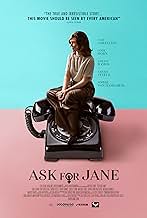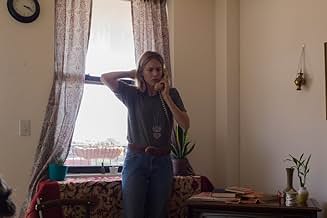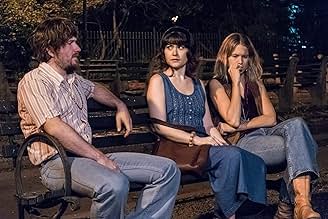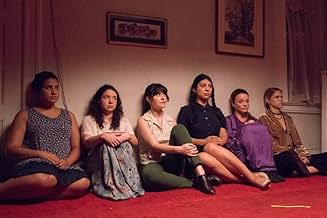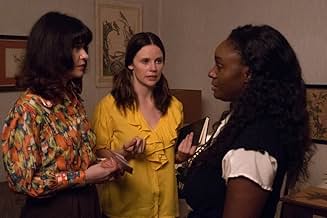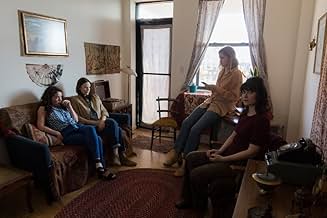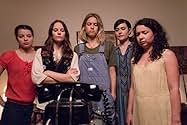Agrega una trama en tu idiomaA group of determined Midwestern women begin providing safe but illegal abortions in this 1960s period drama based on a true story.A group of determined Midwestern women begin providing safe but illegal abortions in this 1960s period drama based on a true story.A group of determined Midwestern women begin providing safe but illegal abortions in this 1960s period drama based on a true story.
- Premios
- 4 premios ganados en total
- Dirección
- Guionistas
- Todo el elenco y el equipo
- Producción, taquilla y más en IMDbPro
Opiniones destacadas
A different movie and was really worth watching. I liked sets and designs.
A story that must be told and addressed always. Shows how this crap still has to be fought. Bible thumpers don't know how to mind their business and keep their religion and politics to theirselves amongst their own believers. Church and state still.mingle on daily. Just stuck living in the past forever in make believe Bible land. This is a medical procedure that lies in the hands and choice of the women who CHOOSE this for themselves and their well being. It is Not the business of the holier than thou hypocrite sinners who complain at every turn and provide zero support to those they want to force into their ways. Not to mention do the same exact stuff in the dark undercover. Ok sorry im a little touchy about this subject.
I was very engrossed in watching Ask for Jane. Though I am of the same generation, aware and well read, I didn't know about the Janes. I wonder whether publicity about them ever reached the East Coast. I had to keep reminding myself that the film took place in the Midwest, thereby making the plight of women more of a struggle than in more progressive cities on both Coasts. Their location also explained the way the women looked, which puts a positive spin on it, rather than saying the director screwed up. Some of the outfits they wore and hair styles were not very realistic. In fact, one was downright distracting: one of the main characters, Rose, had a dye job, in which the bottom three inches or her hair were reddish while the rest was dark brown. To my knowledge this type of hombre effect in hair coloring did not become a popular style until after the Millennium.
But hair and clothes aside, the film is powerful in its portrayal of dedicated young women who felt strongly enough about helping women, including themselves, to risk being arrested and convicted of a crime. Ultimately the film is about the oppression of women, and how the right to control one's own body, and even to know and understand one's body, had always been in the hands of men.
The film was strong in showing how in most situations, the women were always expected to defer to men, whether their husbands, fathers, doctors or clergy. Despite coming from relatively conservative backgrounds, the women portrayed, the Janes as they were known, were brave, noble and revolutionary. I hope they got (or get) at least some of the recognition they deserved.
But hair and clothes aside, the film is powerful in its portrayal of dedicated young women who felt strongly enough about helping women, including themselves, to risk being arrested and convicted of a crime. Ultimately the film is about the oppression of women, and how the right to control one's own body, and even to know and understand one's body, had always been in the hands of men.
The film was strong in showing how in most situations, the women were always expected to defer to men, whether their husbands, fathers, doctors or clergy. Despite coming from relatively conservative backgrounds, the women portrayed, the Janes as they were known, were brave, noble and revolutionary. I hope they got (or get) at least some of the recognition they deserved.
I love this movie so much. 1) I had no idea that the Jane Collective existed. 2) There couldn't be a better moment to talk about this history and the way in which legalizing abortion saves women's lives, both literally and figuratively. But 3) it's a really great movie! Well written, beautifully acted, well directed; this is a compelling story about a group of women finding their individual and collective voices as they endeavor to help each other and to help strangers.
Greetings again from the darkness. Sometimes the message of a movie is so much more important than the production quality that we can look past the 'how' that would normally make watching a chore, and instead focus on the 'what' and the 'why' to find enlightenment. Writer-director Rachel Carey's first feature film, co-written with Cait Cortelyou, tells the fascinating story of The Jane Collective ... also known as 'The Janes' and 'The Abortion 7'. It's yet another true life story that finds us asking ourselves, "How have I never heard of this before?"
The film opens in 1972 when abortion was still illegal. The camera focuses on women in a jail cell ... women that seem quite out of place behind bars. We then flashback 4 years to a dorm room in Chicago, and female students are discussing the predicament of one of their friends. This leads to the development and early stages of the Jane Collective, a secret organization to assist women in obtaining counseling and abortion. This was a time when not only was abortion illegal, but doctors would often speak directly to a husband about medical options for their wife, leaving the women with little information and no power to make their own decisions. The film touches on just how desperate women were. Rat poison, self-punches to the gut, razor blades, knitting needles, and even jumping off roofs were all used as 'solutions' to a situation for which they were only half responsible.
Now depending on your views, you may find abortion unacceptable. This underground abortion network assisted 11,000 women between 1968 and 1973, when Roe vs. Wade legalized the procedure. This landmark legal decision put an end to the Janes, as well as the back alley con artists and dangerous methods women previously used. Co-writer Cait Cortelyou stars as Rose, a character based on the real life Heather Booth, a hero to many. Supporting roles are covered by Cody Horn, Chloe Levine, Sarah Steele, Ben Rappaport, Sophie von Hasleberg, Alison Wright, Danny Flaherty, and Michael Rabe (son of the late Oscar winning actress Jill Clayburgh). Judith Arcana, a real life Jane, has a cameo and was a consulting producer on the film.
With a budget of only $250,000 raised (fittingly) through grass roots donations, the film is not a slick Hollywood production; however, these are women from recent history who deserve to be recognized and remembered for their courage and commitment. Women were forced to look out for each other, and these women certainly stepped up. With the recent legal attention being brought back to the topic of abortion, this story is quite timely, despite having taken place 50 years ago. How sad.
The film opens in 1972 when abortion was still illegal. The camera focuses on women in a jail cell ... women that seem quite out of place behind bars. We then flashback 4 years to a dorm room in Chicago, and female students are discussing the predicament of one of their friends. This leads to the development and early stages of the Jane Collective, a secret organization to assist women in obtaining counseling and abortion. This was a time when not only was abortion illegal, but doctors would often speak directly to a husband about medical options for their wife, leaving the women with little information and no power to make their own decisions. The film touches on just how desperate women were. Rat poison, self-punches to the gut, razor blades, knitting needles, and even jumping off roofs were all used as 'solutions' to a situation for which they were only half responsible.
Now depending on your views, you may find abortion unacceptable. This underground abortion network assisted 11,000 women between 1968 and 1973, when Roe vs. Wade legalized the procedure. This landmark legal decision put an end to the Janes, as well as the back alley con artists and dangerous methods women previously used. Co-writer Cait Cortelyou stars as Rose, a character based on the real life Heather Booth, a hero to many. Supporting roles are covered by Cody Horn, Chloe Levine, Sarah Steele, Ben Rappaport, Sophie von Hasleberg, Alison Wright, Danny Flaherty, and Michael Rabe (son of the late Oscar winning actress Jill Clayburgh). Judith Arcana, a real life Jane, has a cameo and was a consulting producer on the film.
With a budget of only $250,000 raised (fittingly) through grass roots donations, the film is not a slick Hollywood production; however, these are women from recent history who deserve to be recognized and remembered for their courage and commitment. Women were forced to look out for each other, and these women certainly stepped up. With the recent legal attention being brought back to the topic of abortion, this story is quite timely, despite having taken place 50 years ago. How sad.
Selecciones populares
Inicia sesión para calificar y agrega a la lista de videos para obtener recomendaciones personalizadas
- How long is Ask for Jane?Con tecnología de Alexa
Detalles
- Tiempo de ejecución1 hora 48 minutos
- Color
Contribuir a esta página
Sugiere una edición o agrega el contenido que falta

Principales brechas de datos
By what name was Ask for Jane (2018) officially released in India in English?
Responda

